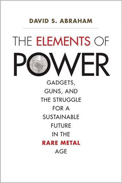
 |
The Elements of Power: Gadgets, Guns, and the Struggle for a Sustainable Future in the Rare Metal Age
by David W. Abraham
Yale University Press
Natural resource strategist and consultant David S. Abraham unveils the state of the rare metals industry in this sweeping and fascinating narrative that says as much about the business and science of rare metals as it does about us, the people who consume them. To accomplish this task, Abraham spans the globe from South America through former soviet block nations and ultimately to Asia, giving us a feel for the industry from mine to market.
Abraham marks the dawn of the Rare Metal Age at the moment electronic circuitry took dominance in everyday life. This coincides with the rise of the millennials, who have not lived in a world without the need to recharge or replace batteries. Even the batteries themselves contain rare metals, but most people are ignorant of our rare metal dependency. For example, just a small amount niobium, makes a ton of steel many times stronger, and micro amounts of dysprosium, as well as other rare metals, help compose a cell phone’s vital parts. Rare metals aren’t just rare; they are irreplaceable. They are also pervasive, from energy-generating technologies, such as wind turbines and solar arrays, to personal electronics, such as televisions and computers. These valued elements have even found their way into the circuitry of simple items like electric toothbrushes and toasters. The importance of rare metals to modern military weaponry, from detection equipment to warplanes, is paramount to security and progress. We just can’t seem to get enough. For decades, blueprints in both technology companies and the Pentagon have awaited the discovery or extraction of rare metals in order to breathe life into their plans.
To make all of this possible, rare metals require challenging mining and extraction efforts. While mining has caused negative impact on certain regions, sometimes devastatingly so, extraction involves a series of sophisticated mechanical and chemical applications, which are often accomplished in less than ideal circumstances. Abraham speaks of metallurgists hunkered inside crude smelting facilities, applying acids like witch doctors and exposing themselves and the environment to toxic byproducts. In some nations, mining rare metal ores from the earth is a lucrative sideline for its people. Regulation and control of this fast-growing industry has been challenging and often impossible.
Even though rare metals are important, they are not typically measured in the tonnage, and, therefore, major commodity traders are not typically interested in the business. This opens the door to private dealers and ultimately smugglers. And we haven’t even mentioned the political implications of controlling certain elements. While rare metals know no borders, they run up against politics nonetheless. China, who is the largest and sometimes exclusive producer of certain rare earth metals, manipulates the supply chain to whatever end it feels necessary, both economically and geopolitically.
In his complete tour of rare earth metals, Abraham tells us everything we wanted to know, but didn't even know we needed to ask. He shares stories of rare metal history and the characters who populate its bloodlines, taking us behind the scenes to reveal the mines, extraction facilities, and metals brokers and buyers—not to mention world's appetite for rare metal end products. The book itself is well researched and referenced, but does not overwhelm the average reader with the science and methodology. He makes the subject matter highly accessible and engaging. The book concludes with a wake-up call to the modern world. We must accept the fact that rare metals are finite and environmentally challenging to recover, but have become an essential part of modern life and a path toward green liviing. Therefore, we need to better regulate the process and distribution, as well as discover ways to preserve and reclaim the tonnage of rare metals we dispose in landfills each year.
RECOMMENDED by the US Review
Next Focus Review
Previous Focus Review